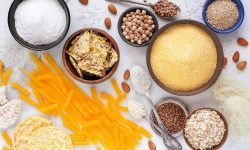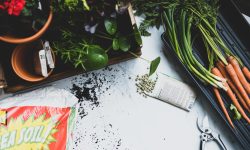Favourite Gluten-Free Items Available at Spud May National Celiac Awareness Month, but every day Spud…
Did you know that by choosing fair-trade organic bananas, you can help save the world, and the difference is only about ten cents?
We all know that the direct correlation between pesticides and reduction of nutrients has become a major health concern amongst consumers. You’ve been told to splurge a little extra on organic strawberries and apples because of their high pesticide residue. You’ve also been told fair-trade organic bananas aren’t necessary because of the thick skin that shields them from pesticides. Ranking 30th on the EWG’s Dirty Dozen list, bananas are indeed less of a health concern. There is no nutritional difference between a fair-trade organic banana and a conventional banana. So why spend the money on fair-trade organic bananas?
What if I tell you that buying fair-trade organic bananas isn’t about you? What if I told you that by choosing fair-trade organic bananas, you are essentially supporting something bigger?
I believe that bananas are the first step in realizing that we can effectively change this planet for the better.
The world’s most consumed produce item (16.5 million tons in 2012) is bananas, and in major banana-producing countries, notably Ecuador and Costa Rica, 44 to 65 kilograms of pesticides are used per hectare every year, more than any other fruits in the world. This impacts half a million people in Ecuador alone. Banana workers have been reported to suffer from acute dermatitis, kidney failure, depression, respiratory problems, cancer, miscarriages, and birth effects. Unfortunately, this long list of damaging health effects; the weekly spraying of pesticides; and the contamination of waterways, livestock, neighbouring homes, and farms are all funded by our choices on one single fruit.
Children are no exception to pesticide poisoning. In 2011, 150 children suffered direct poisoning from a spray plane that flew over their school during the spraying of a plantation. In Costa Rica, children living close to a banana plantation were found to have an unacceptably high cancer risk due to exposure to fungicide mancozeb. The carcinogenic products are either carried by the wind or carelessly sprayed by planes into nearby homes.
In recent years, retail and import costs have decreased while production costs and living costs have all increased in banana-producing countries. Consequently, three-quarters of workers in Ecuadorian banana plantations now live below poverty line; this impacts over two hundred thousand families who depend on banana production.
These low wages have led to another major issue: child labour. Children are pulled out of school to supplement their parents’ inadequate wages. A report by Human Rights Watch revealed that children as young as eight years old do intensive physical labour, transferring heavy loads of bananas within the plantation with little access to drinking water or bathrooms.
In addition to the devastating social impacts caused by conventional bananas, the environmental impacts are equally substantial. Pesticides are often aerially applied at banana plantations, resulting in 85% of the agrochemicals landing on nearby homes and workers instead of the crop. The chemicals, destructive to the environment, then seep into the soil and eventually leach into the nearby ocean, allowing blue-green algae to flourish, killing fish, marine mammals, and coral reefs.
We have a choice, and our purchasing power does make a difference. At between five and ten cents per banana, it’s not a huge purchase. It is more expensive, but it’s not a Tesla.
If we want to make our world better for our children, then we must make changes. Over a hundred years ago, Leo Tolstoy wrote, everyone thinks of changing the world, but no one thinks of changing [themselves]. With the hottest July on record, can we wait another hundred years?
Our world is crazy, and we have to deal with so many issues, but a change starts with a small action. So if you were looking for an easy starting point, a small step forward, then I would like to suggest that you consider switching to organic bananas. Tell your friends and your family: wouldn’t it be great if we can change the world by changing our bananas?
Thanks for reading,
Peter




